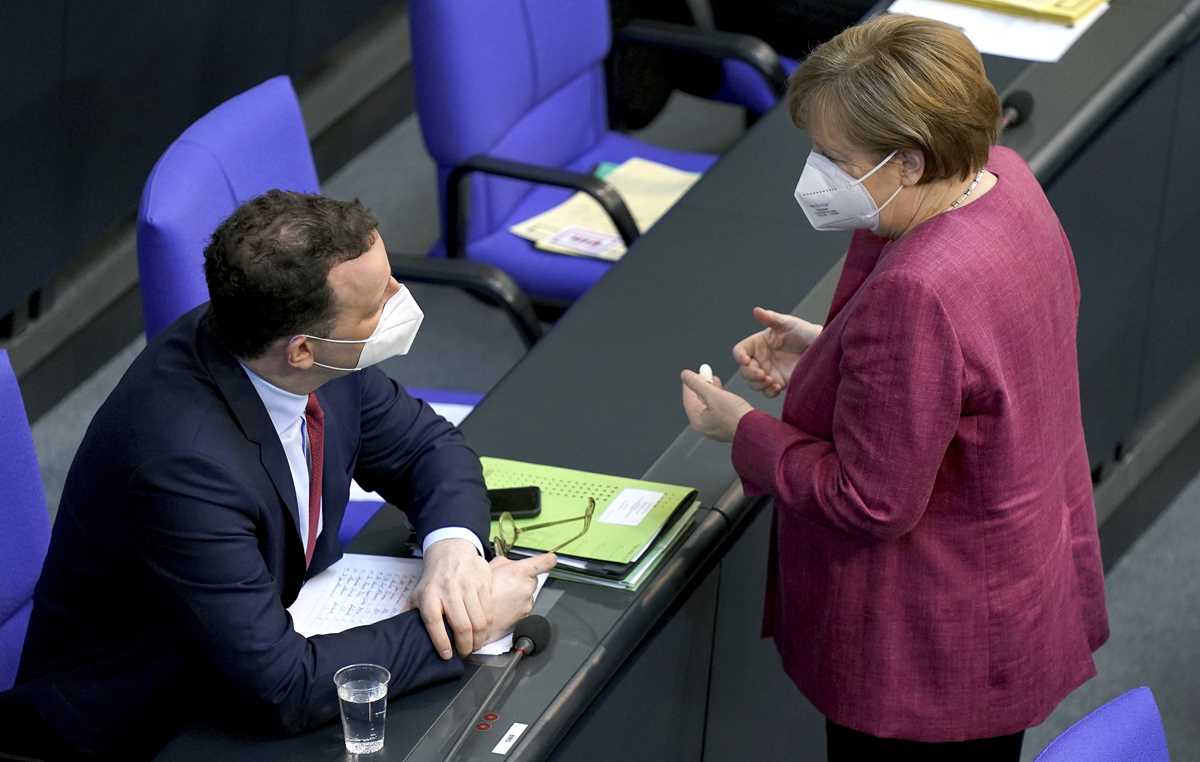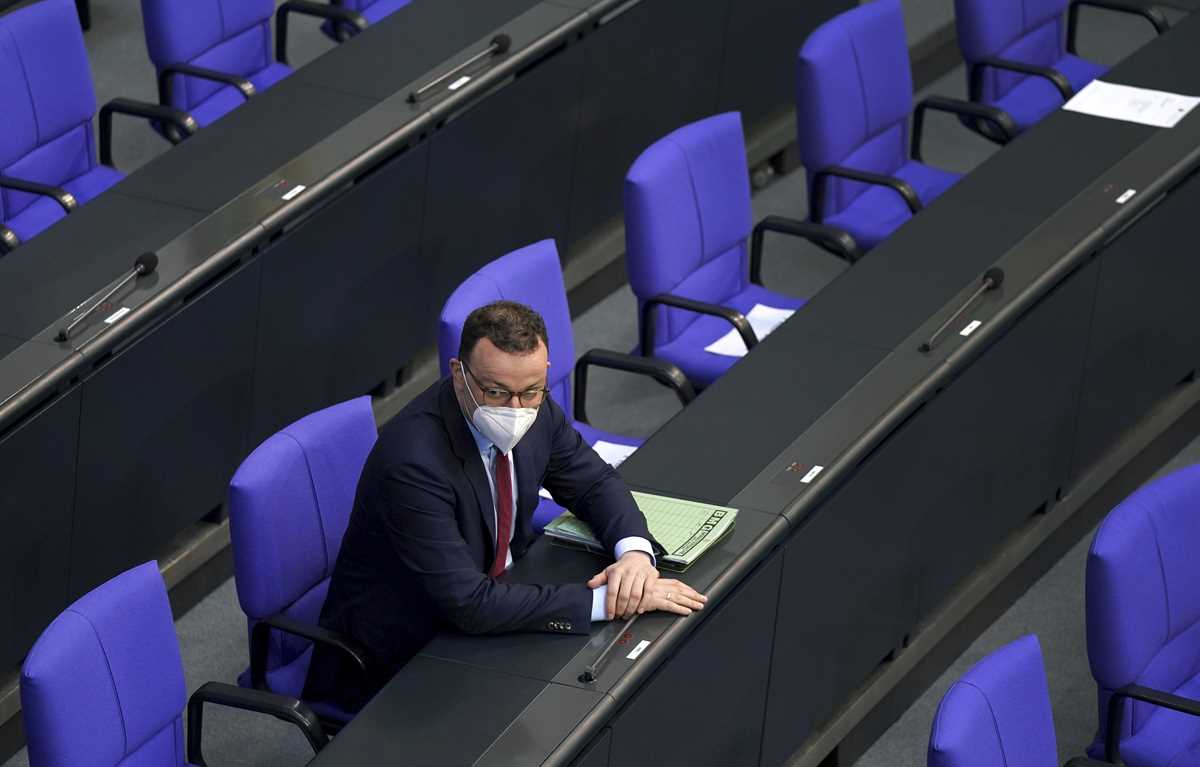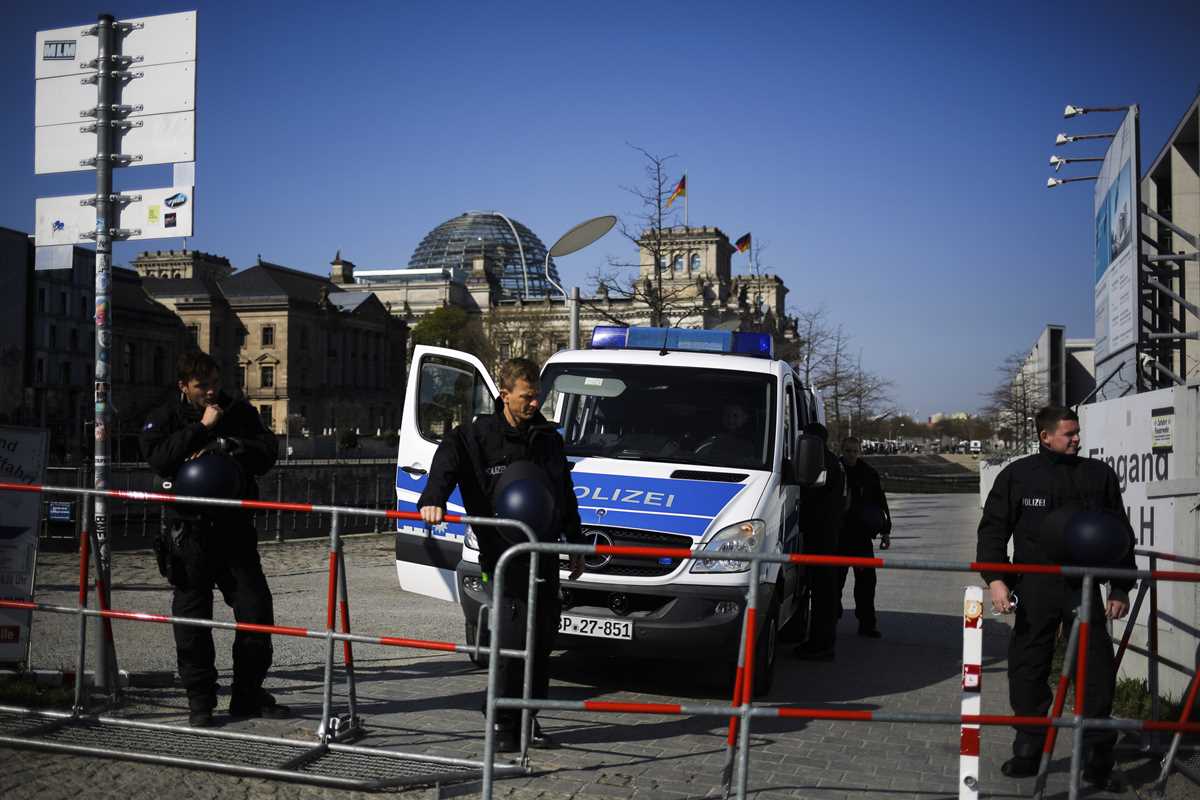 A demonstrator waves a US flag as he attends a protest rally against the German government's policy to battle the corona virus pandemic in Berlin, Germany, Wednesday, April 21, 2021.The parliament decides on a law that gives the federal government more power to battle the coronavirus pandemic. (AP Photo/Markus Schreiber)
A demonstrator waves a US flag as he attends a protest rally against the German government's policy to battle the corona virus pandemic in Berlin, Germany, Wednesday, April 21, 2021.The parliament decides on a law that gives the federal government more power to battle the coronavirus pandemic. (AP Photo/Markus Schreiber) German Chancellor Angela Merkel, right, talks to German Health Minister Jens Spahn, left, during a meeting of the German federal parliament, Bundestag, at the Reichstag building in Berlin, Germany, Wednesday, April 21, 2021. (AP Photo/Michael Sohn)
German Chancellor Angela Merkel, right, talks to German Health Minister Jens Spahn, left, during a meeting of the German federal parliament, Bundestag, at the Reichstag building in Berlin, Germany, Wednesday, April 21, 2021. (AP Photo/Michael Sohn) Demonstrator attend a protest rally against the German government's policy to battle the corona virus pandemic near the Brandenburg Gate in Berlin, Germany, Wednesday, April 21, 2021.The parliament decides on a law that gives the federal government more power to battle the coronavirus pandemic. (AP Photo/Markus Schreiber)
Demonstrator attend a protest rally against the German government's policy to battle the corona virus pandemic near the Brandenburg Gate in Berlin, Germany, Wednesday, April 21, 2021.The parliament decides on a law that gives the federal government more power to battle the coronavirus pandemic. (AP Photo/Markus Schreiber) German Health Minister Jens Spahn attends a meeting of the German federal parliament, Bundestag, at the Reichstag building in Berlin, Germany, Wednesday, April 21, 2021. (AP Photo/Michael Sohn)
German Health Minister Jens Spahn attends a meeting of the German federal parliament, Bundestag, at the Reichstag building in Berlin, Germany, Wednesday, April 21, 2021. (AP Photo/Michael Sohn) German Chancellor Angela Merkel arrives for a meeting of the German federal parliament, Bundestag, at the Reichstag building in Berlin, Germany, Wednesday, April 21, 2021. (AP Photo/Michael Sohn)
German Chancellor Angela Merkel arrives for a meeting of the German federal parliament, Bundestag, at the Reichstag building in Berlin, Germany, Wednesday, April 21, 2021. (AP Photo/Michael Sohn) Police officers secure the German parliament, the Reichstag building prior to a protest rally against the government's policy to battle the corona virus pandemic in Berlin, Germany, Wednesday, April 21, 2021. The parliament decides on a law that gives the federal government more power to battle the coronavirus pandemic. (AP Photo/Markus Schreiber)
Police officers secure the German parliament, the Reichstag building prior to a protest rally against the government's policy to battle the corona virus pandemic in Berlin, Germany, Wednesday, April 21, 2021. The parliament decides on a law that gives the federal government more power to battle the coronavirus pandemic. (AP Photo/Markus Schreiber)BERLIN (AP) — German lawmakers voted Wednesday on a proposal by Chancellor Angela Merkel’s government to mandate uniform restrictions in areas where the coronavirus is spreading too quickly, while thousands of protesters gathered a on a nearby street.
The legislation to apply an “emergency brake” consistently in areas with high infection rates is intended to end the patchwork of measures that has often characterized the pandemic response across highly decentralized Germany’s 16 states.
The lower house of parliament was voting on the plan Wednesday. The upper house, where state governments are represented, is due to consider the legislation Thursday. If approved by both, it would apply until the end of June.
“As hard as it is, as sick of it as we are, reducing contacts helps,” Health Minister Jens Spahn told lawmakers.
“We are again seeing 5,000 COVID-19 intensive care patients and rising, with the age of the patients sinking," Spahn said. "We want to avoid an overburdening of our health system, an overburdening that many of our neighboring countries have experienced painfully.”
Not far from the parliament's Reichstag building, police said about 8,000 protesters assembled, few of them wearing masks. Police said they would break up the gathering after organizers failed to get participants to comply with coronavirus restrictions.
“There are some people out there today on the streets of this city who say it isn’t serious and there’s almost nothing going on," Vice Chancellor Olaf Scholz said in parliament. "Yes, something is going on: 80,000 people in this country have died, and you can’t talk past or overlook that.”
“Because that’s the case, and because the situation is still serious, something must be done beyond what we have done so far," Scholz said. "And what we need now is clarity and consistency for what happens when the…infection rates rise too much.”
The proposal features plans to impose a 10 p.m.-5 a.m. curfew, limit personal contacts, close leisure and sports facilities and shut or restrict access to many stores.
The measures would kick in for areas where there are more than 100 weekly new cases per 100,000 residents. Schools would have to switch to distance learning at a higher rate of 165.
Germany’s nationwide rate stood at 160 new cases per 100,000 residents on Wednesday, though there were wide regional variations.
Opposition lawmakers advanced a variety of arguments against the bill. Alexander Gauland of the far-right Alternative for Germany, which opposes lockdown measures in general, called it an “attack on rights of freedom, federalism and common sense.”
The Greens had different objections. “This emergency brake remains too half-hearted, too ineffective, too inconsistent and too disproportionate,” lawmaker Maria Klein-Schmeink said.
Before you consider RLI, you'll want to hear this.
MarketBeat keeps track of Wall Street's top-rated and best performing research analysts and the stocks they recommend to their clients on a daily basis. MarketBeat has identified the five stocks that top analysts are quietly whispering to their clients to buy now before the broader market catches on... and RLI wasn't on the list.
While RLI currently has a "Moderate Buy" rating among analysts, top-rated analysts believe these five stocks are better buys.
View The Five Stocks Here
Need to stretch out your 401K or Roth IRA plan? Use these time-tested investing strategies to grow the monthly retirement income that your stock portfolio generates.
Get This Free Report